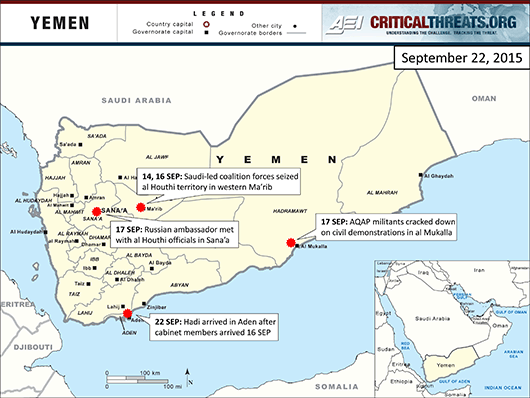Russia’s flurry of diplomatic activity in the Yemen peace talks suggests that it perceives the resolution of the current political-military stalemate as an opportunity to increase its regional prestige and undermine Western influence. The Saudi-led coalition is still unable to produce a major military breakthrough despite waging an intensive bombing campaign on al Houthi supply lines in northern Yemen.
Russia may begin playing a larger role in negotiations to resolve Yemen’s ongoing conflict. On September 9, a Russian delegation met with Saudi Foreign Minister Adel bin Ahmed al Jubair in Riyadh to discuss Yemen’s ongoing conflict. Russia’s ambassador to Yemen, Vladimir Dedushkin, met with Yemeni Prime Minister and Vice President Khaled Bahah on September 13 and Yemeni President Abdu Rabbu Mansour Hadi on September 15 in Riyadh. Dedushkin expressed support for Hadi’s government and UNSCR 2216 in both meetings and met with al Houthi officials in Sana’a on September 17. Separately, a delegation including al Houthi and General People’s Congress representatives traveled to Muscat, Oman, on September 20 to meet with the UN envoy to Yemen, Ismail Ould Cheikh Ahmed. The al Houthis also delivered six foreign hostages, including two Americans, to Oman as a sign of goodwill.
The Saudi-led coalition is preparing for an offensive against Sana’a. Senior Yemeni and UAE officers confirmed coalition forces seek to secure Ma’rib and al Jawf for an offensive from the east and Taiz for an offensive from the south on September 13. Coalition airstrikes destroyed several bridges and roads and al Houthi ammo depots in Sana’a, Ma’rib, and Taiz to reduce the al Houthis’ ability to reinforce their remaining positions. The al Jawf governor also met with pro-Hadi Yemeni military officials to discuss plans for an al Jawf offensive. Coalition forces seized territory along both fronts over the last few days, but both offensives are unlikely to maintain their momentum due to local reports of an influx of al Houthi reinforcements in Taiz and Ma’rib.
Hadi and several cabinet members returned to Aden to re-establish his government in Yemen. On September 16, Yemeni Vice President Khaled Bahah and seven Yemeni ministers arrived in Aden, where Bahah asserted in meetings that the liberation of Taiz and restoration of Aden’s media and educational institutions were among his main priorities. The Yemeni government met with UAE government delegations and humanitarian aid groups implementing security cooperation and social service projects in Aden. Yemeni President Hadi arrived in Aden and set up his residence in the al Qasir hotel in al Sha’ab city on September 22. He will be traveling to New York City for the UN General Assembly.
Al Qaeda in the Arabian Peninsula (AQAP) is exploiting the Yemeni government’s focus on southern Yemen to maintain control of al Mukalla. On September 14, the Hadhrami Domestic Council (HDC) called for AQAP to surrender military, government, and energy buildings and the Yemeni government to resume the provision of basic services in Hadramawt. AQAP militants cracked down on local demonstrations over ongoing diesel shortages and blackouts on September 17 and claimed that its militants would remain in al Mukalla until the HDC could sufficiently address local security issues. HDC member Mohsen Basra accused Hadi’s government of limiting the provision of basic services to trigger local uprisings against AQAP. The National Petroleum Company responded to the civil unrest by pledging to support the local population and provide emergency supplies in Hadramawt on September 21. It is unclear whether Hadi’s government had any role in starting this initiative.
AQAP and the Islamic State in Iraq and al Sham (ISIS) continued efforts to leverage the ongoing conflict for recruitment. AQAP senior member Khalid Batarfi called for the anti-al Houthi opposition to unite with AQAP fighters and work together to achieve shari’a-based governance in Yemen in a September 17 video. Separately, the ISIS Wilayat Hadramawt media office released a video condemning Muslim migrants in the West, reacting to the crisis in Europe, and advocating their return to Muslim lands. (Sources available on request.)
Russia will continue its diplomatic efforts in Yemen as part of its broader strategy of capitalizing on current regional conflicts to increase its influence. The success of the Saudi-led coalition’s northern and southern offensives will depend on whether its bombing campaign can effectively disrupt nearby al Houthi supply lines. It is unclear whether Hadi’s government and the Saudi-led coalition will attempt to leverage the local opposition against AQAP to liberate al Mukalla.
← PREVIOUS |
NEXT → |

